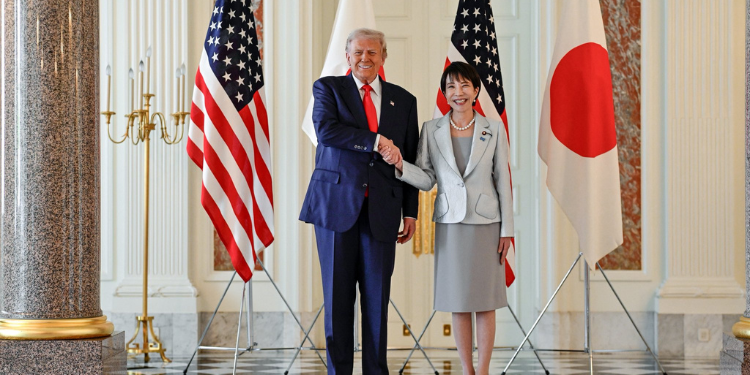President Donald Trump met with Japan’s first female prime minister, Sanae Takaichi, in Tokyo to sign a landmark trade agreement. The deal focuses on rare earth minerals and nuclear energy collaboration, aiming to boost economic ties and secure critical supply chains.
The agreement highlights both countries’ efforts to reduce dependence on global competitors for essential materials. Rare earth minerals are crucial for technology, renewable energy, and defense industries. Analysts say this deal could help the U.S. secure a steady supply while deepening strategic cooperation with Japan.
During the meeting, leaders emphasized the importance of economic resilience. Trump noted that the agreement reflects a shared commitment to safeguarding vital industries and supporting mutual growth. Takaichi highlighted the opportunity for Japan and the U.S. to work together on advanced technologies, including nuclear power.
Experts view the trade deal as a strategic response to growing global uncertainties. Supply chain disruptions and geopolitical tensions have made access to rare earth minerals a priority for both nations. The collaboration on nuclear energy is also seen as a move to promote cleaner, more efficient power sources while reinforcing energy security.
The agreement includes joint initiatives to develop mining technologies and streamline export processes. Both governments plan to invest in research and infrastructure to enhance production capabilities and reduce reliance on third-party suppliers. This approach is expected to strengthen economic stability and create opportunities for industries in both countries.
Market analysts suggest the deal may influence global mineral markets. By coordinating supply and production, the U.S. and Japan could stabilize prices and mitigate shortages in key sectors such as electronics, defense, and renewable energy. The agreement also sets a precedent for other nations seeking to secure critical resources through strategic partnerships.
In addition to economic benefits, the trade deal carries diplomatic significance. It reinforces the U.S.-Japan alliance amid rising regional competition. Experts note that by working together on rare earth minerals and nuclear power, both countries signal their commitment to shared security and technological advancement.
Takaichi, Japan’s first female prime minister, emphasized that this agreement is a milestone in bilateral relations. She stated that collaboration in rare earth minerals and nuclear power would help both nations achieve long-term economic growth. The move is also expected to encourage innovation and create jobs in technology and energy sectors.
The rare earth trade deal comes at a critical time as countries worldwide seek to secure essential resources. Analysts predict that this partnership could inspire similar agreements in other regions, fostering global cooperation in high-demand industries.
Both leaders concluded the Tokyo summit with a joint statement confirming their commitment to continued dialogue and cooperation. The trade agreement is expected to be implemented gradually, with detailed plans for technology sharing, mining operations, and nuclear energy projects.
The U.S.-Japan deal marks a significant step in strengthening economic and technological ties. By focusing on rare earth minerals and nuclear power, the two nations aim to enhance supply chain security, boost innovation, and reinforce their strategic partnership amid a complex global landscape.


